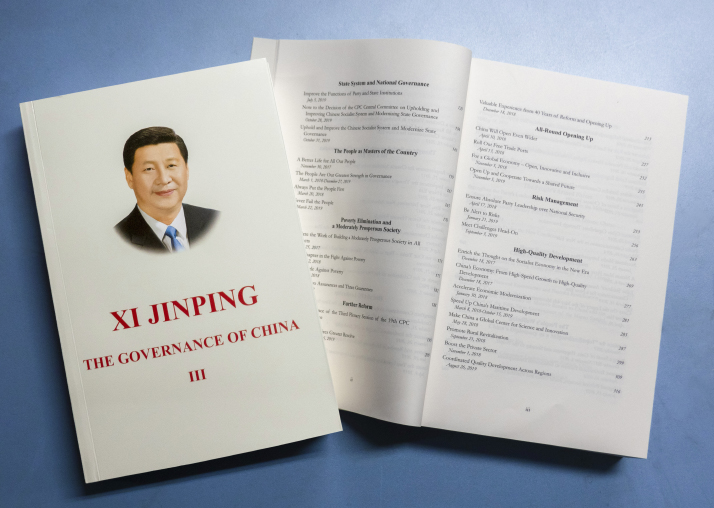| Opinion |
| President Xi's new book highlights practical innovation | |
|
|
 The English edition of the third volume of Xi Jinping: The Governance of China (WANGXIANG)
The third volume of Xi Jinping: The Governance of China, a collection of President Xi Jinping's speeches, conversations, instructions and letters written between October 18, 2017 and January 13, 2020, should be read keeping in mind the development of modern Chinese civilization.
More than a century ago, China's traditional civilization began to be severely impacted by the waves of modernization. In the process of building a modern civilization, China chose to reorganize the country and society under the leadership of a political party, and ultimately, the Communist Party of China (CPC) undertook the historical mission. To address the disconnect between a scattered traditional society and the growing demand for the orderly construction of a modernized nation, the People's Republic of China established a planned economic system and unit-based social system, the units being different work organizations, in the early days of its founding. Thanks to the hard work of millions for more than 20 years, the tasks to establish a basic stage of socialist modernization were completed. To promote the sustainable development of this modernization, the Third Plenary Session of the 11th CPC Central Committee in 1978 decided to implement a reform and opening-up policy. In 1992, the 14th CPC National Congress made the decision to set up a socialist market economic system, marking the establishment of a modern market in China. In 1997, the 15th CPC National Congress announced the decision to build a socialist country under the rule of law, signifying the comprehensive development of a modern country. In 2002, the 16th CPC National Congress introduced the Three Represents, a socio-political guideline for the CPC to always represent the requirements for developing advanced productive forces, the orientation of an advanced culture, and the fundamental interests of the overwhelming majority of the people. It marked the CPC's comprehensive promotion of theoretical innovation and development in accordance with the requirements of the market economy and rule of law. In 2007, the 17th CPC National Congress proposed building a harmonious socialist society, marking the establishment of a modern society in China. By the 18th CPC National Congress in 2012, the major elements for building a modern civilization, such as a modern political party, a modern country, a modern market and a modern society, had basically been completed. However, construction of modern Chinese civilization still faced two problems. One was insufficient development of internal functions, and the other a lack of internal integration. Development of China's modern civilization reached a point in which it needed to leap from the stage of cultivating major elements to sketching the overall picture. In this context, the CPC held its 18th National Congress. To accelerate shaping the overall format of China's modern civilization, the 18th CPC Central Committee proposed at its third plenary session in November 2013 to comprehensively deepen reforms based on a top-level design, improve and develop socialism with Chinese characteristics, and promote the modernization of the national governance system and governance capacity. Subsequently, the fourth, fifth and sixth plenary sessions respectively arranged for promoting law-based governance, completing building a moderately prosperous society in all respects, and enforcing strict Party self-governance. The first and second volumes of Xi Jinping: The Governance of China are compilations of the major speeches and concepts of Xi to guide the advance of modern Chinese civilization after the 18th CPC National Congress. Since the 18th CPC National Congress, the CPC Central Committee has comprehensively deepened reforms. It has promoted improving the functioning of the Party, society and the market while honing the relationships between the major elements in accordance with the needs of modernization. Finally, it was necessary to sketch a clear blueprint for China's modern civilization and comprehensively promote its construction. This was done at the 19th CPC National Congress in 2017.
 A hi-tech industrial zone in Yulin, Shaanxi Province in northwest China, on May 26. The area was covered by sand dunes 20 years ago (XINHUA)
In the report delivered at the opening session of the congress, Xi, who is also general secretary of the CPC Central Committee, said socialism with Chinese characteristics has entered a new era. The principal contradiction facing Chinese society has evolved to contradiction between unbalanced and inadequate development and people's ever-growing needs for a better life. The report expounded Xi Jinping Thought on Socialism with Chinese Characteristics for a New Era and offered basic strategies while clarifying strategic arrangements to secure a decisive victory in building a moderately prosperous society in all respects and move on to all-out efforts to build a great modern socialist country. The report represents comprehensive arrangements for building socialism with Chinese characteristics in the new era as well as a systematic design outlining the format of China's modern civilization. The third volume of Xi Jinping: The Governance of China includes Xi's report, which tops the table of contents, followed by 19 sections arranged by topic to interpret the guiding principles of the 19th CPC National Congress. They center on three aspects: carrying out the proposals made at the congress, implementing the blueprint designed at the congress, and advancing work in practice. The third volume not only interprets and elaborates the guiding spirit of the 19th CPC National Congress, but also enriches and deepens the connotations of those guiding principles through practical innovation. Moreover, it collects the new decisions, ideas and policies put forward by Xi during the process of building socialism with Chinese characteristics. The book represents not only important instructions for building socialism with Chinese characteristics in the new era, but also a blueprint for tomorrow's Chinese civilization. The author is an associate professor with the School of International Relations and Public Affairs, Fudan University, Shanghai (Print Edition Title: A Blueprint for Tomorrow's China) This is an edited version of the original article published in China Pictorial Copyedited by Sudeshna Sarkar Comments to yanwei@bjreview.com |
|
||||||||||||||||||||||||||||||
|
